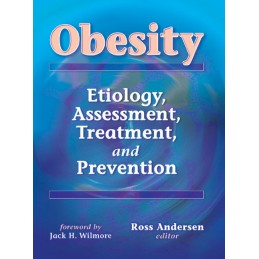- Reduced price

Order to parcel locker

easy pay


 Delivery policy
Delivery policy
Choose Paczkomat Inpost, Orlen Paczka, DHL, DPD or Poczta Polska. Click for more details
 Security policy
Security policy
Pay with a quick bank transfer, payment card or cash on delivery. Click for more details
 Return policy
Return policy
If you are a consumer, you can return the goods within 14 days. Click for more details
Obesity:: Etiology, Assessment, Treatment, and Prevention is a comprehensive professional reference of weight management research and techniques. Featuring chapters from some of the worlds top specialists in the field of weight control, it provides the most current and accurate information available today for treating obesity.
The textbook combines a literature review with practical applications, incorporating expert analysis and synthesis of obesity treatment and prevention. The book is an important resource that will prepare health professionals and clinicians to help patients of all ages manage this complex and pervasive disease.
Obesity:: Etiology, Assessment, Treatment, and Prevention devotes an entire chapter to treating and preventing obesity in children and discusses other relevant topics::
- Nutrition therapy
- Physical activity
- Alternative therapies such as pharmacotherapy
- Promising trends in obesity treatment
In addition, graphs, tables, and chapter summaries make it easy for busy professionals to find and review key issues on the topic.
As obesity continues to increase at an alarming rate throughout the world, this reference provides practitioners with the latest insight into integrating physical activity, nutrition, psychology, and medicine to help obese patients manage their weight.
Data sheet
Foreword
Jack Wilmore, PhD
List of Contributors
Preface
Ross Andersen, PhD, FACSM
Part I: Etiology of Obesity
Chapter 1. Prevalence of Overweight and Obesity in the United States
Carlos J. Crespo, DrPH, MS, FACSM
Ellen Smit, PhD, RD
Chapter 2. Psychosocial Correlates and Consequences of Obesity
Myles S. Faith, PhD
Patty E. Matz, PhD
David B. Allison, PhD
Chapter 3. Economic Aspects of Obesity: A Managed-Care Perspective
Nicolaas P. Pronk, PhD
Chapter 4. Genetic Influences on Obesity
Brock A. Beamer, MD
Part II: Assessment of the Obese Patient
Chapter 5. Health-Related Quality of Life in Obese Individuals
Kevin R. Fontaine, PhD
Susan J. Bartlett, PhD
Chapter 6. Body Composition Assessment in the Obese
Timothy G. Lohman, PhD
Laurie Milliken, PhD
Chapter 7. Clinical Evaluation of the Obese Patient
Samuel C. Durso, MD
Chapter 8. Dietary Intake: Recording and Analyzing
Judith M. Ashley, PhD, RD
Vicki H. Bovee, MS, RD
Chapter 9. Assessment of Physical Activity and Energy Expenditure
Michael J. LaMonte, PhD, MPH
Barbara E. Ainsworth, PhD, MPH
Catrine Tudor-Locke, PhD
Section III: Treatment and Prevention
Chapter 10. The Importance of Body Weight Maintenance in Successful Aging
James Dziura, MPH
Loretta DiPietro, PhD, MPH
Chapter 11. Treating and Preventing Pediatric Obesity
Marian Tanofsky-Kraff, MA
Helen Hayden-Wade, PhD
Paul A. Cavazos, BA
Denise E. Wilfley, PhD
Chapter 12. Medical Nutrition Therapy Application
Laure Sullivan, RD
Chapter 13. Physical Activity Treatment
Shawn C. Franckowiak, BS
Ross E. Andersen PhD, FACSM
Chapter 14. Physical Activity As a Therapeutic Modality
John M. Jakicic, PhD
Chapter 15. Helping Individuals Reduce Sedentary Behavior
Brian E. Saelens, PhD
Chapter 16. Physical Activity Promotion as a Public Health Strategy for Obesity Prevention
Adrian Bauman, MD, PhD
David Crawford, PhD
Chapter 17. Medication for Weight Management
William Hartman, PhD
Joan Saxton, MD
Chapter 18. Future Directions in Treating Obesity
Dana M. Catanese, BA
Melissa L. Hyder, BA
Walker S. Carlos Poston, PhD, MPH
John P. Foreyt, PhD
Index
About the Editor
